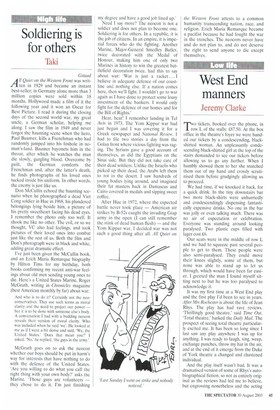Soldiering is for others
Taki
Gstaad A"Quiet on the Western Front was written in 1929 and became an instant best-seller; in Germany alone more than 3 million copies were sold within 18 months. Hollywood made a film of it the following year and it won an Oscar for Best Picture. I read it during the closing days of the second world war, my great uncle, a German scholar, helping me along. I saw the film in 1949 and never forgot the haunting scene when the hero, Paul Baumer, kills a Frenchman who had randomly jumped into his foxhole in noman's-land. Baumer bayonets him in the throat, after which he watches the man die slowly, gurgling blood. Overcome by guilt, the German comforts the Frenchman and, after the latter's death, he finds photographs of his loved ones tucked inside his uniform. In other words, the enemy is just like us.
Don McCullin echoed the haunting scenario when he photographed a dead Viet Cong soldier in Hue in 1968, his plundered belongings lying beside him, a picture of his pretty sweetheart facing his dead eyes. I remember the photo only too well. It shook me like no other. The evil, or so we thought, VC also had feelings, and took pictures of their loved ones into combat just like the rest of us. Both the film and Don's photograph were in black and white, adding great dramatic effect.
I've just been given the McCullin book, and an Erich Maria Rennarque biography by Hilton Tims for my birthday, both books confirming my recent anti-war feelings about old men sending young ones to die. Here's a United States Marine, Roger McGrath, writing in Chronicles magazine (best American monthly by far) about war: And who is to do it? Certainly not the twoconservatives. They use such terms as moral clarity and the need to project our power — but it is to he done with someone else's body. A conversation I had with a budding neocon reveals their version of moral clarity. Who was included when he said 'we'. He looked at me as if I were a bit dense and said, 'We, the United States.—Does that mean you?' I asked. 'No.' he replied. the guys in the army: McGrath goes on to ask the neocon whether our boys should be put in harm's way for interests that have nothing to do with the defence of the United States. 'Are you willing to do what you call the right thing with your own body?' asks the Marine. 'Those guys are volunteers — they chose to do it. I'm just finishing
my degree and have a good job lined up.'
Need I say more? The neocon is not a soldier and does not plan to become one. Soldiering is for others. In a republic, it is the job of citizens. In an empire, it is imperial forces who do the fighting. Another Marine, Major-General Smedley Butler, twice decorated with the Medal of Honour, making him one of only two Marines in history to win the greatest battlefield decoration twice, had this to say about war: 'War is just a racket ... I believe in adequate defence of our coastline and nothing else. If a nation comes here, then we'll fight. I wouldn't go to war again as I have done to protect some lousy investment of the bankers. I would only fight for the defence of our homes and for the Bill of Rights.'
Hear, hear! I remember landing in Tel Aviv in 1973. The Yom Kippur war had just begun and I was covering it for a Greek newspaper and National Review. I had to file two stories a day from the Golan front where vicious fighting was raging. The Syrians gave a good account of themselves, as did the Egyptians on the Sinai side. But they did not take care of their dead soldiers. Unlike the Israelis who picked up their dead, the Arabs left them to rot in the desert. I saw hundreds of young bodies lying around, and imagined their fat masters back in Damascus and Cairo covered in medals and sipping sweet coffee.
After Hue in 1972, where the expected battle never took place — American air strikes by B-52s caught the invading Giap army in the open (I can still remember the stink of dead human flesh) — and the Yom Kippur war. I decided war was not such a good thing after all. All Quiet on the Western Front attests to a common humanity transcending nation, race, and religion. Erich Maria Remarque became a pacifist because he had fought the war in the trenches. The neocons never have and do not plan to, and do not deserve the right to send anyone to die except themselves.


























































 Previous page
Previous page